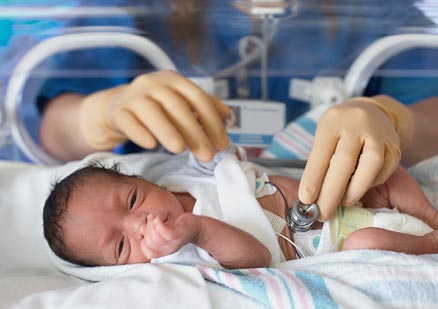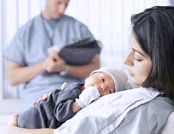Special care for babies

If your pregnancy is high-risk, we’ll help you prepare for the possibility that your baby might need care in the NICU. However, most NICU stays are unexpected. Seeing your baby in the unfamiliar environment of the NICU can be overwhelming at first. We’ll help you adjust and support you as you bond with your little one.
- Special beds called incubators to keep babies warm and help protect them from infection
- Respirators, nasal tubes, or oxygen hoods to help babies breathe
- Feeding tubes or glucose drips to help babies get enough nutrients
- Monitors to track vital signs and alert the staff to your baby’s needs
Our NICU doctors, nurses, and support staff specialize in caring for newborns who have special medical needs. They all work together to provide the best care possible for your new baby 24 hours a day.
- Neonatologists are pediatricians with additional training in caring for sick and premature babies.
- Neonatal nurse practitioners are nurses with advanced training in the care of newborns.
- Specialists are doctors with medical expertise in certain areas, like cardiology or neurology.
- Registered nurses specialize in the treatment and care of newborns in the neonatal intensive care unit.
- Respiratory therapists are specially trained to treat any breathing problems.
Bonding with your baby in the NICU
Parents are an important part of the NICU care team — and our goal is to help you be with your baby as much as possible while providing the specialized care they need. Most babies can be held soon after they arrive in the NICU. If you’re not able to hold your baby at first, you can still nurture them and let them know you’re there. You can:
- Touch your baby and hold their little hand or foot
- Talk or sing to your baby — they already know your familiar and comforting voice
- Feed your baby or be there for feedings
Skin-to-skin contact
Skin-to-skin contact after birth triggers healthy baby behaviors, helping little ones adjust to life outside the womb. If your baby is in the NICU, we’ll help you hold them skin-to-skin as soon as it’s medically possible — even if your newborn is still being supported by feeding and breathing machines.
Bringing your baby home from the NICU
Once your baby reaches a few important milestones, it’s time for them to leave the NICU and continue growing stronger from home. We’ll know your baby is ready to go home when:
- They’re steadily gaining weight and can breastfeed or bottle-feed
- Their body temperature remains stable in a normal infant bed
- Their heart rate and breathing rate are stable for a week
YOU MIGHT ALSO LIKE
Ready to get maternity care?
Find a hospital or care provider near you.


